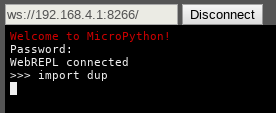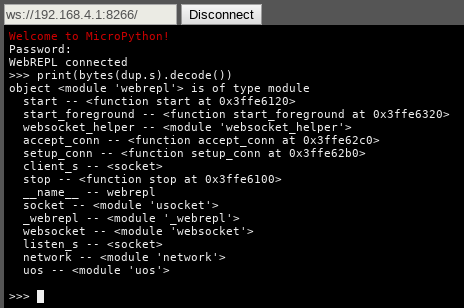I looked how the server side of webrepl works:
https://github.com/micropython/micropyt ... webrepl.py
In accept_conn() I learned how to correctly deal with the previous term returned by uos.dupterm():
Code: Select all
...
prev = uos.dupterm(None)
uos.dupterm(prev)
...
With that and pagano.paganino's DUP class is is so easy to redirect any stdout output into a bytearray.
Here you see sample application output, "back" is emitted after calling "help(webrepl)" with no visible output.
But after "back" the content of the bytearray gets printed!
Code: Select all
$ webrepl_client.py -p abcd 192.168.4.1
Password:
WebREPL connected
>>>
>>>
MicroPython v1.9.4-623-g34af10d2e on 2018-10-03; ESP32 module with ESP32
Type "help()" for more information.
>>> import dup
back
object <module 'webrepl'> is of type module
start -- <function start at 0x3ffe6120>
start_foreground -- <function start_foreground at 0x3ffe6340>
websocket_helper -- <module 'websocket_helper'>
accept_conn -- <function accept_conn at 0x3ffe62e0>
setup_conn -- <function setup_conn at 0x3ffe62d0>
client_s -- <socket>
stop -- <function stop at 0x3ffe6100>
__name__ -- webrepl
socket -- <module 'usocket'>
_webrepl -- <module '_webrepl'>
websocket -- <module 'websocket'>
listen_s -- <socket>
network -- <module 'network'>
uos -- <module 'uos'>
>>> f=open('dup.py'); print(f.read()); f.close()
...
This is new version of "dup.py":
Code: Select all
...
>>> f=open('dup.py'); print(f.read()); f.close()
import io
import os
import webrepl
class DUP(io.IOBase):
def __init__(self, s):
self.s = s
def write(self, data):
self.s += data
return len(data)
def readinto(self, data):
return 0
s = bytearray()
prev = os.dupterm(DUP(s))
help(webrepl)
os.dupterm(prev)
print("back")
print(bytes(s).decode())
>>>
With redirection of stdout output I will look now whether a pipe mechanism for upysh commands is possible ...
P.S:
I was successful with proof of concept for adding pipeing to upysh commands, sweet:
viewtopic.php?f=15&t=233&p=31604#p31604
Code: Select all
>>> cat("tst.txt")
first
second().
ThirD
Fourth()
>>> head(lambda: tail("tst.txt", 3), 2)
second().
ThirD
>>> head("tst.txt", 2)
first
second().
>>>

